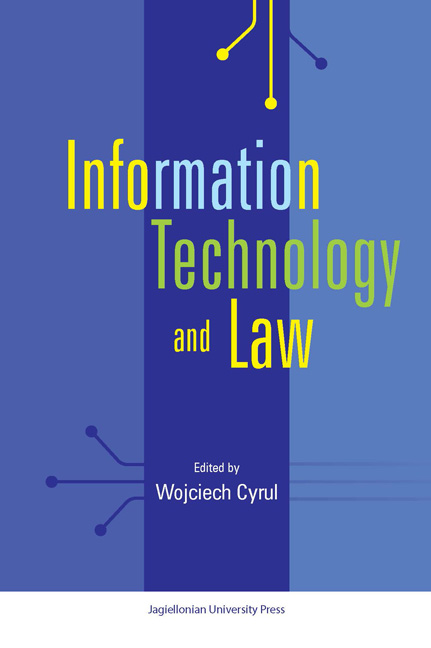Book contents
- Frontmatter
- CONTENTS
- Preface
- Chapter 1 Technological Destabilization of Law
- Chapter 2 Problems with the Storing and Presentation of Information
- Chapter 3 XML Models for Legal Documents: Current Polish Practices and International Standards
- Chapter 4 Similarity Analysis of Polish Legal Documents Using WordNets Semantic Relations
- Chapter 5 Consolidation of Legal Documents in an Electronic Format
- Chapter 6 A Three Dimensional – Code and a Question of the Normative Hyper-linking?
- Chapter 7 The Law, Labour Unions and Information Technology: Enhancing or Restricting Democracy at the Workplace
- Chapter 8 Protection of the Consumer in Digital Content Contracts
- Chapter 9 Procedure, Time and Imputation in Criminal Law
- Frontmatter
- CONTENTS
- Preface
- Chapter 1 Technological Destabilization of Law
- Chapter 2 Problems with the Storing and Presentation of Information
- Chapter 3 XML Models for Legal Documents: Current Polish Practices and International Standards
- Chapter 4 Similarity Analysis of Polish Legal Documents Using WordNets Semantic Relations
- Chapter 5 Consolidation of Legal Documents in an Electronic Format
- Chapter 6 A Three Dimensional – Code and a Question of the Normative Hyper-linking?
- Chapter 7 The Law, Labour Unions and Information Technology: Enhancing or Restricting Democracy at the Workplace
- Chapter 8 Protection of the Consumer in Digital Content Contracts
- Chapter 9 Procedure, Time and Imputation in Criminal Law
Summary
The computerization of legal turnover, legal drafting and the application of law is gradually making them dependent on information technology. This justifies the importance of a number of considerations concerning the technological dimension of legal practice. Given the potential benefits and risks associated with the progressive digitalization and computerization of legislation and the growing importance of the Internet, the issue of the role and uses of information systems in the legal domain requires careful, multi-dimensional analysis.
The impact of information technology on law is still an open question. However, there is no doubt that these technologies are changing the way in which law is created, communicated, applied and interpreted, since they provide new ways of sharing, searching, communicating and analyzing legal information. Communication imposes on human practices and, in particular on legal practices, many specific requirements and restrictions. Therefore, the implementation of new technologies into communication processes cannot only help to overcome some traditional problems, such as allowing, for instance, the improvement of existing practices, but it may also cause new problems or make old ones even graver. For example, the development of information technologies may result in the creation of new goods and services, or may change the scope or the field of application of traditional ones. It makes new risks appear, requiring the reinterpretation of existing rules or the introduction of new regulations.
- Type
- Chapter
- Information
- Information Technology and Law , pp. 7 - 10Publisher: Jagiellonian University PressPrint publication year: 2014



